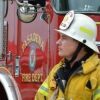Can you hear me now? Good! Because I’ve got something to tell you about. Hearing loss is a serious concern for those in the fire service. This problem also impacts police officers, EMTs, and other first responders who work with noisy equipment and ride in vehicles with sirens.
Let’s focus on the causes of hearing loss and ways to prevent it.
Hearing hazards
Research shows firefighters and other public safety personnel have high rates of hearing loss. This is no surprise, given the kinds of noise we’re subjected to in our daily work activities. Of course, firefighting isn’t the only profession where hearing loss is a constant risk.
According to the National Institute for Occupational Safety and Health (NIOSH), part of the Centers for Disease Control and Prevention (CDC), around 22 million Americans are regularly exposed to dangerous noise levels while on the job.
Because of this, the NIOSH recommends a hearing loss prevention program for any worker exposed to noises above 85 decibels for significant periods of time.
To give you a frame of reference for different levels of noise, here’s a handy guide (ranked from quietest to loudest):
As first responders, we are exposed to occupational noise hazards every day, so it makes sense that hearing loss is among the most common work-related complications.
According to a 2013 study, firefighters regularly work with 13 different kinds of equipment that can produce noise that exceeds the 85-decibel threshold. The list of equipment includes saws, fans and pumps, but by far the biggest sonic hazard comes from sirens. The siren in most common use on fire apparatus is the Federal Signal Q2B, which puts out an ear-splitting 123 decibels of noise at 10 feet.
Here are a few more facts you probably don’t want to hear. According to another survey:
- 40% of firefighters have noticeable hearing loss. For many of us, it’s severe by the time we retire. The number for law enforcement personnel is a whopping 80%.
- 67% of police officers said they had to ask people to repeat themselves quite often in daily conversations.
- 66% were worried about what would happen if their agency knew about their hearing loss.
What your heart hears
Did you know hearing loss is the third most common chronic physical condition for firefighters, after high blood pressure and arthritis? As first responders, we are at high risk with all three of these conditions. Yet too few of us get the treatment we need.
Also, according to a 2021 article on FireRescue1, our noisy work environments impact more than just our hearing. “One study determined that traffic noise is associated with an increased risk of on our bodies, including our cardiovascular and metabolic health, while another showed that living and working in noisy areas, such as cities or near highways, increased the frequency of strokes by 30%. Conversely, living and working in quieter areas reduced stroke frequency by 25%.”
The CDC notes that continuous exposure to noisy environments can also cause (or increase) stress, anxiety and depression—which are already a concern for first responders. It just goes to show that loud noises impact far more than just our ears.
Reducing the damage
All of us in public safety are exposed to loud noises on a regular basis and for long intervals. From our sirens and airhorns to chain saws and heavy equipment, we in the fire service have plenty of reasons to think about protecting our hearing. Our colleagues in law enforcement deal with potentially dangerous sound levels during target practice, in dealing with radio traffic, and at working with civil protests (with both sides shouting at each other). First responders of all stripes work special events like concerts and sporting events, where hearing protection simply isn’t feasible.
While there aren’t many ways we can eliminate noise exposure, we can take proactive steps to prevent and reduce hearing loss. The first step is simply recognizing when the noise around you is dangerously loud. Damage is likely occurring if:
- You have to shout to be heard.
- You have decreased or “muffled” hearing for various hours after exposure.
- The noise makes your ears ring.
- The noise is painful to your ears.
Once you’ve identified the situations likely to damage your hearing, you can take proactive steps to save your ears. Here are some things you can do:
- Get your hearing tested every year. Fewer than 20% of those surveyed had their hearing tested within the past two years.
- Take precautions when you can safely do so, such as wearing hearing protectors such as earplugs or headsets.
- Supply personal protective equipment (PPE) to personnel. Most never receive training in hearing protection, so supplementary training might be a good choice.
- Lower the volume when using headphones or earbuds.
- Talk to your doctor if you have concerns regarding your hearing.
Blindness separates us from things, but deafness separates us from people.” — Helen Keller
Lastly, tune in to this
Loud noises can permanently impair your hearing. Most of us aren’t aware of the damage until it’s too late. Once you lose your hearing, you will not be able to recover it. This is the key takeaway during National Protect Your Hearing Month.
As first responders we are exposed to many occupational hazards. We know this going into our profession. The main goal should be to start your career healthy and strong, and to finish your career healthy and strong. Minimize your exposure as much as possible by following safety precautions, using proper fitting earplugs and protection, and encouraging your agency to adopt hearing protection policies and procedures. This is of paramount importance for preventing and reducing hearing loss.









